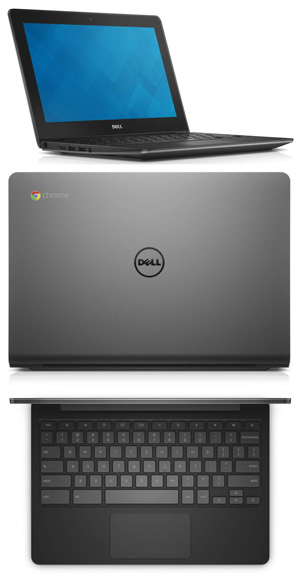Mobile Devices | News
Dell Rolling Out Chromebooks for Education
|

Dell's 11.6-inch Chromebook features a dual-core Haswell processor and supports 802.11a/b/g/n WiFi.
|
Dell is expanding into the Chromebook business. The company today formally unveiled its own line of Chromebooks designed specifically for K-12 education.
The new Dell Chromebook 11, which will start rolling out next month, will be powered by a dual-core, 1.4 GHz Intel Celeron 2955U processor. The first two models will include one with 4 GB of onboard DDR3 memory, followed later by one with 2 GB. They will both feature an LED-backlit, 11.6-inch screen with a resolution of 1,366 x 768 powered by Intel HD graphics. The devices will support 802.11a/b/g/n WiFi and will include Bluetooth 4.0.
Other features include:
- 16 GB embedded solid state drive with a boot time of about 8 seconds;
- SD card slot for removable storage;
- HDMI port supporting 1080p video output;
- Front-facing 720p HD camera;
- Dual USB 3.0 ports;
- Two 2 watt speakers; and
- 10-hour batter life.
The devices measure 0.97" x 11.6" x 7.9" and weigh in at 2.9 pounds.
To go along with the hardware, Dell is launching an app called Dell Wyse PocketCloud, which is designed as a collaborative file sharing tool for students and teachers. It supports tablets, smart phones, traditional computers and Chromebooks and will be available in the Google Chrome Web Store in January.
Dell is also offering service and support for the devices to schools and is providing an online management console designed for IT administrators, providing a central point for configuring, administering, tracking, managing, and securing the Chromebooks in school settings.
According to Dell: "The management console allows IT administrators and teachers to quickly push or remove applications and enforce safe browsing practices across all Chromebooks in a school's network or in a specific learning environment. Automated updates and 'defense in depth' security features like sandboxing, verified boot, data encryption and easy recovery block or avoid malware, viruses and data loss, saving significant time on maintenance and troubleshooting so that educators can focus on student success."
The devices have already been piloted in a number of schools in the United States. Jon Phillips, director of global education at Dell, said responses from those schools was positive, citing the sturdiness of the device (which is not ruggedized, but which features edge-to-edge glass for a stronger screen), support for the 802.11a standard, and processing power.
On that last point, Phillips told THE Journal, although Chromebooks generally don't handle the kinds of local processing tasks that traditional computers need to tackle, the CPU is still an important factor: "As Google continues to move many of apps to offline environment, and as education apps become more complex, the need for processing power becomes more important. The processor starts to make a difference."
The units also use components of the Dell Latitude laptop line, including the power adapter. So when a Dell Chromebook power cord is lost, for example, it can be replaced by a common 65 watt laptop power adapter.
"Dell is no stranger to designing and building great computers, particularly in education," said Caesar Sengupta, vice president of product management at Google, in a prepared statement. "Adding Dell's first Chromebook to our stable of devices built for the classroom is a big milestone, and Dell has been a great partner in this effort. The Dell Chromebook 11 with Google Apps for Education will bring exciting new possibilities for learning and collaboration inside and outside the classroom."
The 4 GB Dell Chromebook 11 is expected to be available in January for "less than $300." (Exact pricing was not determined as of press time.) The 2 GB version is expected to ship later in the first quarter of 2014. Additional details can be found on Dell's site.